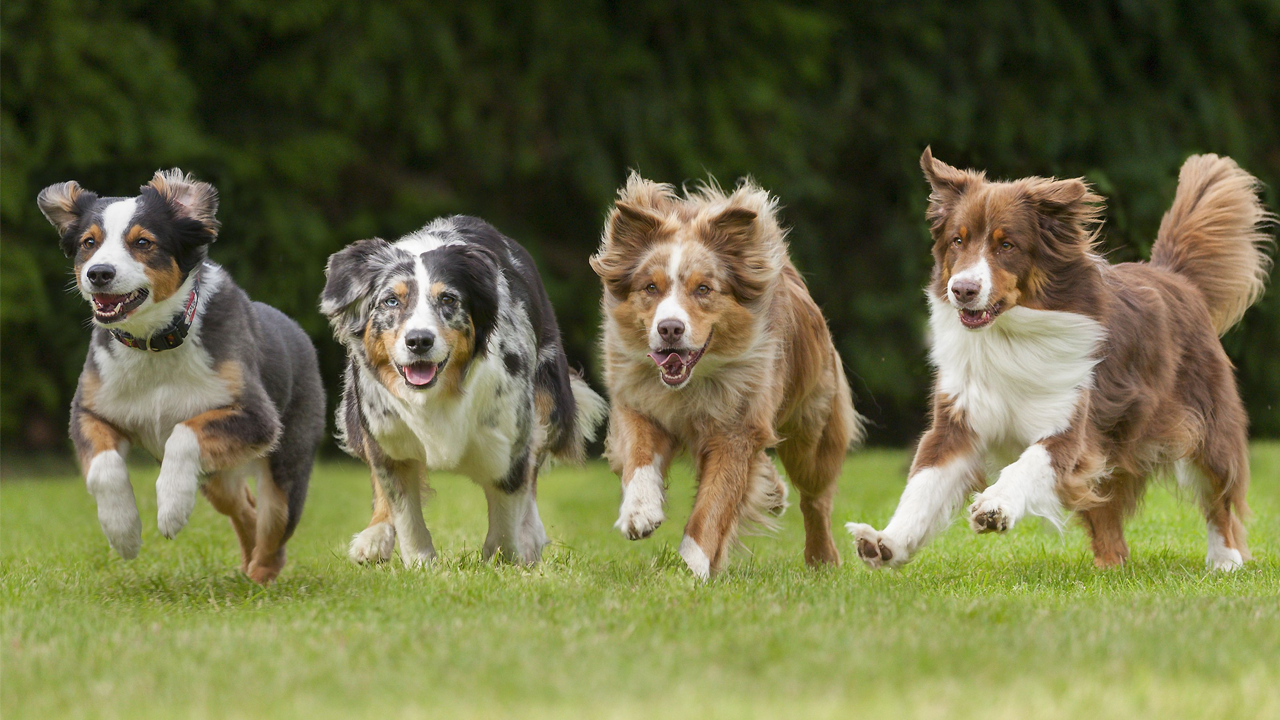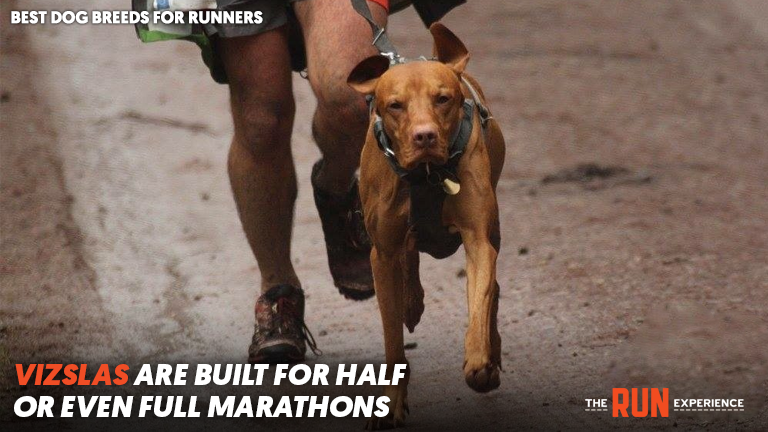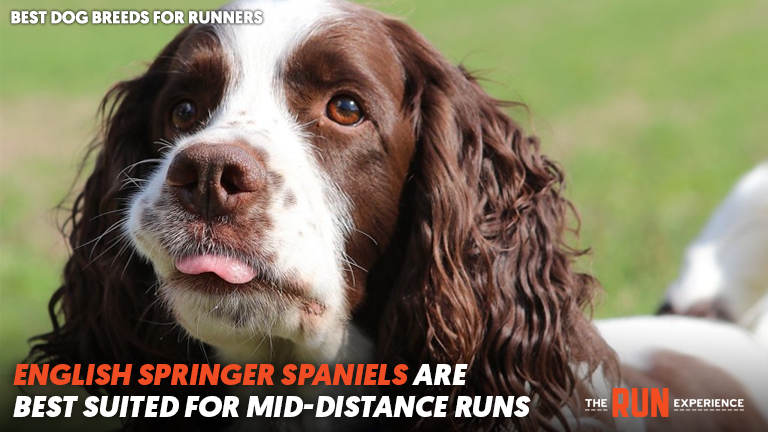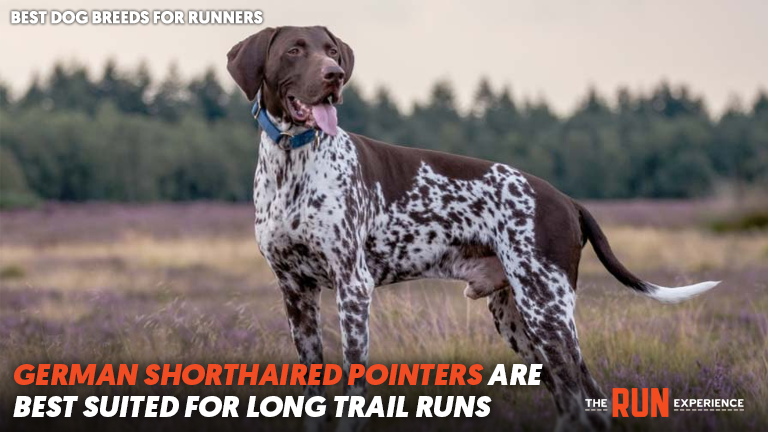The 7 Best Dogs for Running Companions
The best dogs for running companions largely depend on your running style! Learn the best breeds for running by distance and preferences.

Dogs were built to run in packs, just like their ancestor, the wolf. This makes them the perfect running partner. However, when figuring out the best dogs for running companions, there are several factors to take into account—and it starts with dog breeds.
Below, we’ll get into finding the best dog breeds for running and how to know whether you’re 4-legged friend is built to go long-distance, short-distance, or just for jogs around the park.
The Best Dogs for Running Companions
In this article, we are going to dive into the best dog breeds for whatever distance or running style you gravitate towards. However, remember, these are general observations.
Just as humans break the mold against their genetics and disposition, the best running dog breeds can as well. You might find one dog breed built for short distances that can go for long days, just as you might find a well-trained running dog for long distances that is built better for sprinting.
TLDR: Quick List of the Best Running Dogs Breeds:
- Weimaraner: Best Large Dog Breed for Running
- Dalmatian: Best for Short-to-Mid Distance Runs
- Vizsla: Best Dog Breed for Long Distances
- Rhodesian Ridgeback: Best Running Dog Breed for Half Marathons
- English Springer Spaniel: Best Running Dog Breed for 10K Distances
- Siberian Husky: Best Dog Breed for Long Distance Running (Except in Warm Temperatures)
- German Shorthaired Pointer: Best Small Dog Breed for Long Distance Running
Large Dog Breeds for Running
1. Weimaraner: The Ideal Companion for Long, Steady Runs
Weimaraners, known for their boundless energy and athletic build, are an excellent choice for runners looking for a long-distance companion. These dogs are not just high-energy—they thrive on physical activity and mental stimulation, making them perfect for those who enjoy longer, more challenging runs.
Originally bred for hunting large game, Weimaraners have a strong prey drive and remarkable endurance. This background makes them particularly well-suited for running in varied terrains, whether it’s a mountain trail or a suburban path. Their history as hunting dogs means they are not only fast but also have the stamina to maintain a steady pace over long distances.
The Weimaraner’s sleek, short-haired coat serves a practical purpose by helping them stay cool in warmer weather, making them an ideal choice for runners who live in hotter climates. Their muscular build and strong legs enable them to keep up with even the most enthusiastic runners.
While they excel at maintaining a consistent, steady pace, Weimaraners are also capable of short bursts of speed. Their versatile nature makes them suitable for various types of runs, from leisurely jogs to more intense interval training.
Unique to their breed, Weimaraners have webbed paws, an attribute that makes them excellent swimmers. This trait can be particularly beneficial for triathletes looking for a furry training partner who can join them in cross-training activities, including swimming.
Alongside their physical capabilities, Weimaraners are known for their intelligence and eagerness to please, which makes them highly trainable. They respond well to positive reinforcement and consistent training, making them a good match for runners who are willing to invest time in training their dog for running alongside them.
2. Dalmatian: The Ideal Breed for Mid-Distance Running

Dalmatians are not only known for their distinctive spotted coat but also for their robust energy levels and sturdy build, making them excellent companions for mid-distance running, such as 10Ks. These dogs are agile, fast, and have a historic background that lends itself well to active lifestyles.
Historically known as carriage dogs, Dalmatians have a natural affinity for running and enduring long distances at a steady pace. Their role in accompanying horse-drawn carriages means they are genetically predisposed to running alongside a partner, an attribute that translates well into running beside a human.
Dalmatians possess a muscular and athletic body, enabling them to handle different types of terrains with ease. Whether it’s a paved road or a rugged trail, their strong legs and sturdy frame allow them to navigate various landscapes comfortably.
While Dalmatians are best suited for short to mid-distance runs, their stamina and speed can be adapted to the runner’s needs. They are capable of sustaining a brisk pace, making them suitable for runners who prefer a more vigorous and challenging routine.
Given their high energy levels, Dalmatians require regular exercise and mental stimulation. They are intelligent and respond well to training, which is essential to ensure they remain well-behaved and focused during runs. A well-exercised Dalmatian is also a well-behaved pet in the home.
3. Vizsla: A Premier Breed for Endurance Running

The Vizsla, a medium to large-sized breed, stands out as an exemplary companion for long-distance runners, especially those who lean towards half-marathon to marathon distances. Their remarkable energy levels and endurance make them ideal for those who seek a canine partner for extended running sessions.
Vizslas are built for endurance. These dogs have a lean yet muscular build, enabling them to cover long distances without tiring quickly. This trait is a significant advantage for runners who engage in prolonged and intensive training sessions.
The Vizsla's short-haired coat is ideal for maintaining a comfortable body temperature during runs, making them well-suited for various weather conditions. Despite their short coat, they can handle cooler temperatures with the right protective gear but thrive in moderate climates.
Their agility and keen senses make them excellent trail running partners. Vizslas are attentive to their surroundings, which can be an asset for runners who explore diverse outdoor environments.
While Vizslas are natural long-distance runners, it's important to build their endurance gradually, just like human runners. Proper training, coupled with regular veterinary check-ups, ensures that they remain healthy and fit for the physical demands of endurance running.
Any downsides to larger breeds?
The only major downside to larger breeds is that they can be predisposed to ailments such as hip dysplasia.
Medium-Sized Dog Breeds for Running
These dogs tend to be best for longer bouts given their smaller stature compared to large dog breeds.
4. Rhodesian Ridgeback: The Ideal Breed for Marathon Training
The Rhodesian Ridgeback is a robust and athletic breed, well-suited for runners who engage in marathon training or long-distance running. Originally bred to hunt lions in South Africa, these dogs have a unique combination of strength, endurance, and speed.
The Ridgeback's lineage as a lion hunter speaks to their incredible stamina and resilience. They possess the strength and endurance required for long, challenging runs, making them perfect companions for marathon runners or those who enjoy lengthy trail runs.
Despite their size, Rhodesian Ridgebacks are surprisingly agile and can adapt their pace to match their running partner. They are just as comfortable on a slow, steady run as they are picking up the pace for more vigorous training sessions.
The breed's most notable feature is the “ridge” of hair along their spine, running in the opposite direction to the rest of their coat. This, along with their well-muscled build and athletic form, equips them for various running terrains and conditions.
Generally healthy, Rhodesian Ridgebacks can be prone to certain conditions like hip dysplasia, which is common in larger breeds. Regular veterinary check-ups and a balanced exercise regimen are important to maintain their health and fitness.
5. English Springer Spaniel: A Versatile Companion for Mid-Distance Running

The English Springer Spaniel, a medium-sized breed known for its agility, endurance, and energetic nature, is an excellent choice for runners who focus on mid-distance runs like 10Ks or potentially even half-marathons. This breed's combination of power and endurance makes it a versatile running companion.
As a hunting and sporting breed, English Springer Spaniels are naturally high-energy dogs. They thrive on physical activity and enjoy being engaged, which makes them enthusiastic running partners. Their zest for exercise can be motivating for runners, adding an element of joy and playfulness to each run.
Springer Spaniels possess a unique blend of endurance and agility, which is ideal for varied running conditions. They can maintain a steady pace over a considerable distance, and their agility is beneficial for navigating different terrains, making them perfect for trail running as well as road running.
They have a strong, muscular build that provides power, yet they are compact enough to be agile and quick. This physical makeup contributes to their ability to handle longer runs without tiring easily, while also being capable of short bursts of speed.
It's important to note that English Springer Spaniels are happiest when they have a job to do or are engaged in activity. Regular running provides them with a sense of purpose and fulfillment. However, due to their hunting instincts, leash training and a strong recall are essential, especially for trail running.
6. Siberian Husky: The Ultimate Breed for Cold Weather

Siberian Huskies are renowned for their endurance and resilience, especially in cold climates, making them exceptional companions for long-distance running, particularly in snowy conditions. Their sled-dog heritage equips them with a remarkable capacity for endurance running.
Huskies are naturally high-energy dogs that were bred to pull sleds over long distances in arctic environments. This background gives them an extraordinary ability to endure long periods of physical activity, making them ideal for distance running, especially in colder weather.
Their thick, double-layered coat is designed to keep them warm in extremely cold temperatures, allowing them to excel in winter running. For runners who enjoy training in snowy or cold conditions, a Husky can be the perfect running partner.
While they thrive in the cold, Huskies can adapt to warmer climates, though it's essential to take precautions during runs. In warmer weather, they require shorter runs with plenty of water and opportunities to cool down, making them less ideal for long runs in hot conditions.
Huskies are independent and intelligent but can sometimes be stubborn, making consistent training important. Early socialization and training are crucial in managing their independent streak and ensuring they are well-behaved and responsive during runs.
Due to their high energy levels, Huskies need ample exercise to prevent boredom and destructive behavior. Regular running provides an excellent outlet for their energy, keeping them mentally and physically stimulated.
7. German Shorthaired Pointer: An Ideal Partner for Energetic Long-Distance Running

The German Shorthaired Pointer, often abbreviated as GSP, is a breed celebrated for its high energy, stamina, and agility, making it an excellent match for runners, especially those interested in long-distance running. Their versatile nature and athletic build offer a perfect blend for various running styles.
German Shorthaired Pointers are known for their boundless energy and endurance, traits that make them ideal for long and challenging runs. They are well-suited for distance running, thriving on the physical and mental stimulation it provides.
Whether you’re training for a marathon, enjoying a trail run, or going for a quick jog, the German Shorthaired Pointer can match your pace and intensity. They are equally adept at maintaining a steady pace for long runs as they are at engaging in more vigorous sprinting sessions.
As with any high-energy breed, the German Shorthaired Pointer requires regular and vigorous exercise to stay happy and healthy. Without adequate physical activity, they can become restless or exhibit behavioral issues. Additionally, their short coat provides minimal insulation, so they may require protective gear in colder climates.
Adopt a Good Running Dog
We here at TRE always recommend checking out your local shelter when you are ready to select a good running dog to join your family. Most shelters are overrun with dogs that are perfectly fit to join a family. You may find just what you are looking for in a “mutt,” as they tend to be the best of all worlds with fewer health issues compared to the full breeds.
And remember, just like us, dogs will need food and water for longer runs over 45 minutes. Always remember to bring water for both you and your dog. You can even have your dog carry her/his own water! You can purchase dog hydration packs such as this one or this one.
Remember, Dogs Need Running Training too!
Although we have created a list of running dog breeds bred with traits that easily translate to running, dogs need running training, just as humans do. So, even if you are an experienced ultra runner, don’t expect your new pup to crush 26.2 with you right off the bat.
Even the best running dog breeds need training.
Allow yourself time to train your dog and get him/her used to running and walking with a leash. The dog must learn to run beside you, not in front of you or behind you. You are taking the dog for a run, not the other way around! You are the leader here and the dog will innately want to follow you.
If you opt for a puppy versus an adult, talk with your veterinarian about your dog’s best age to start running. Generally, you shouldn’t start running with your puppy until he/she is six months, because it might affect their growing joints and muscles.
Choosing Your Dog
When selecting your dog, it is important to match that dog’s energy levels to your own. The “long-distance” or hunting dogs listed were bred for high energy which can consist of 8 hours or more of running and sniffing out game.
If you are training strictly for a 5K, a “high energy” dog is not likely to be a great training partner for you. For that training, you want more of a medium-energy dog. If you are feeling pooped after a training run, you want that dog to be pooped as well.
In fact, most behavior problems that arise in dogs are due to lack of energy expenditure by the owner (not for a lack of love…who knew?!). If their energy is not fully drained on a daily basis, dogs use extra energy to do other things such as, oh I don’t know, ruin your furniture, your favorite stilettos, or your drywall.
Or they may take a different route and pace uncontrollably, or just exhibit general stress. Finding a dog that matches your energy level will lead to a long happy life for the dog and a strong everlasting bond between.
Tips for Selecting the Best Dog for Runners
Selecting the best energy style of dog for you will take some patience. Not all dogs fit neatly into one energy category. And how dogs behave as puppies might not be indicative of their true energy level. A dog might be jumping around when you first meet them at the shelter, but they might not actually be a high energy dog.
And on that note, when selecting a dog or puppy, be sure to wait for everyone (including yourself) to calm down, and refrain from using a high pitched voice. The high energy in your voice will only excite the dog more, making it harder for the dog, and the dogs around, to calm down.
Dogs communicate through body language, energy, and smell. You want the dog to see you as a “pack leader.” Most pack leaders have high energy but are simultaneously calm and assertive. Taking the time to calm yourself will help the dog match your calm energy.
Choose One of the Best Dog Breeds for Running
Finding the right running dog breed will play a big part in your training and your pup’s happiness. Choose the wrong dog, and they won’t want to go out and train for hours on end with you. Choose the right one, and you might have just found your new best friend.
